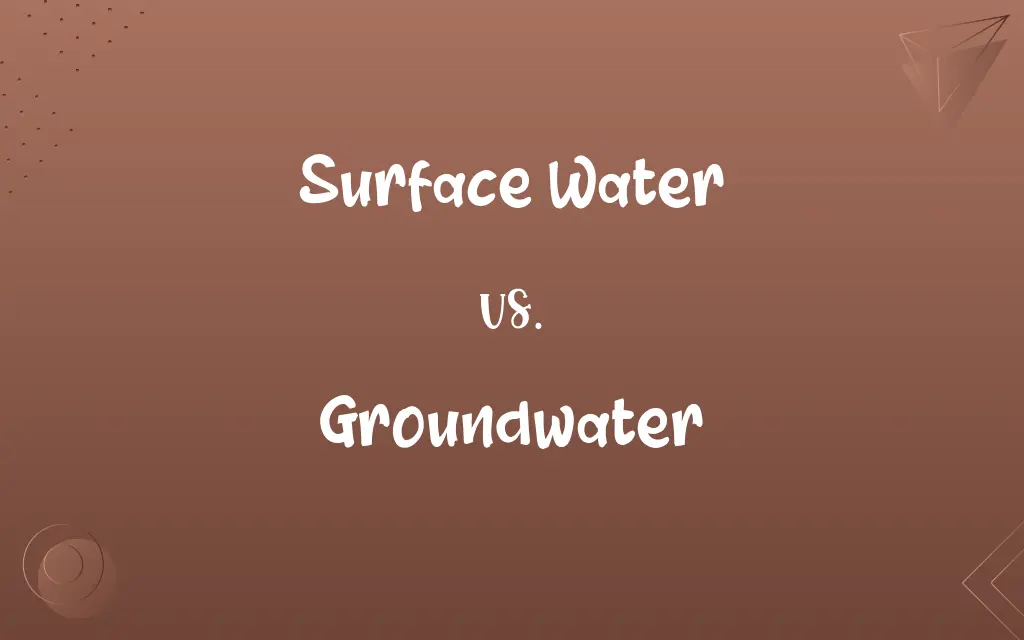Surface Water vs. Groundwater: Know the Difference

By Shumaila Saeed || Published on February 18, 2024
Surface water is water found on Earth's surface, like rivers or lakes, while groundwater is water located beneath the surface in soil or rock.

Key Differences
Surface water refers to all water naturally open to the atmosphere, such as rivers, lakes, and reservoirs. Groundwater, in contrast, is water that saturates the ground, filling all the voids and pores beneath the earth's surface.
Shumaila Saeed
Feb 18, 2024
Surface water is directly influenced by weather and is subject to evaporation and pollution. Groundwater, being filtered through soil and rocks, is typically cleaner and less susceptible to direct pollution.
Shumaila Saeed
Feb 18, 2024
Accessibility varies significantly; surface water is easily accessible and visible, making it a primary source for many activities. Groundwater requires drilling to access, making its use less immediate but often more reliable in dry periods.
Shumaila Saeed
Feb 18, 2024
The regulation and legal aspects differ; surface water is often subject to stringent regulations due to its visibility and impact on ecosystems. Groundwater, being less visible, can be harder to regulate and protect despite its critical role in ecosystems.
Shumaila Saeed
Feb 18, 2024
In the context of ecosystems, surface water provides habitat for many aquatic species, while groundwater often feeds into surface waters, maintaining their levels, especially during dry seasons.
Shumaila Saeed
Feb 18, 2024
ADVERTISEMENT
Comparison Chart
Susceptibility
More prone to pollution and evaporation
Less susceptible to pollution
Shumaila Saeed
Feb 18, 2024
ADVERTISEMENT
Renewability
Quickly replenished but can dry out
Replenishes slowly but more stable
Shumaila Saeed
Feb 18, 2024
Climatic Influence
Directly affected by weather
Less impacted by surface conditions
Shumaila Saeed
Feb 18, 2024
Surface Water and Groundwater Definitions
Surface Water
Surface water is any water that is not absorbed into the ground and remains on the surface.
The park's surface water bodies were teeming with life.
Shumaila Saeed
Jan 22, 2024
ADVERTISEMENT
Groundwater
Groundwater is the water present beneath Earth's surface, often used for drinking water.
The town's groundwater levels have been steadily declining due to overuse.
Shumaila Saeed
Jan 22, 2024
Surface Water
Surface water includes all water visible on the Earth's surface, like seas and ponds.
The Great Lakes are a significant collection of fresh surface water.
Shumaila Saeed
Jan 22, 2024
Groundwater
Groundwater is water that has infiltrated the earth's surface and is stored in aquifers.
Groundwater depletion is a growing concern in arid regions.
Shumaila Saeed
Jan 22, 2024
Surface Water
Surface water is any body of water found above ground, such as oceans, rivers, and lakes.
The Mississippi River is a major source of surface water in the United States.
Shumaila Saeed
Jan 22, 2024
Groundwater
Groundwater is water located beneath the earth's surface in soil pore spaces and in the fractures of rock formations.
Many rural homes rely on groundwater for their wells.
Shumaila Saeed
Jan 22, 2024
Surface Water
Surface water is water collecting on the ground or in a stream, river, lake, wetland, or ocean.
After the heavy rains, the surface water in the fields reflected the sky.
Shumaila Saeed
Jan 22, 2024
Groundwater
Groundwater is subsurface water that fills pores and fractures in the ground.
Groundwater contamination can lead to serious health risks.
Shumaila Saeed
Jan 22, 2024
Surface Water
Surface water refers to external bodies of water, such as streams and reservoirs.
The city's surface water treatment plant ensures clean drinking water for its residents.
Shumaila Saeed
Jan 22, 2024
Groundwater
Groundwater refers to the water found underground in cracks and spaces in soil, sand, and rock.
Groundwater is often tapped for agricultural irrigation.
Shumaila Saeed
Jan 22, 2024
Groundwater
Water beneath the earth's surface, often between saturated soil and rock, that supplies wells and springs.
Shumaila Saeed
Jan 11, 2024
Groundwater
Water that exists beneath the earth's surface in underground streams and aquifers.
Shumaila Saeed
Jan 11, 2024
Repeatedly Asked Queries
Is groundwater always clean?
While groundwater is often cleaner than surface water due to natural filtration, it can still be contaminated by chemicals and pollutants.
Shumaila Saeed
Feb 18, 2024
What is surface water?
Surface water is water that collects on the ground or in a natural or artificial body of water like a river, lake, or reservoir.
Shumaila Saeed
Feb 18, 2024
Why is groundwater considered a reliable water source?
Groundwater is often more reliable during periods of drought, as it is less susceptible to evaporation than surface water.
Shumaila Saeed
Feb 18, 2024
What is groundwater?
Groundwater is water located beneath the Earth's surface in soil pore spaces and the fractures of rock formations.
Shumaila Saeed
Feb 18, 2024
How do surface water and groundwater interact?
Groundwater can feed into surface water bodies, and surface water can infiltrate and recharge groundwater sources.
Shumaila Saeed
Feb 18, 2024
Can surface water be artificially created?
Yes, surface water bodies can be artificially created through dams and reservoirs.
Shumaila Saeed
Feb 18, 2024
How do humans typically access groundwater?
Groundwater is usually accessed through wells drilled into aquifers.
Shumaila Saeed
Feb 18, 2024
What are aquifers?
Aquifers are underground layers of water-bearing permeable rock or materials through which groundwater flows.
Shumaila Saeed
Feb 18, 2024
Can surface water affect weather patterns?
Yes, large bodies of surface water like oceans and lakes can influence local and regional weather patterns.
Shumaila Saeed
Feb 18, 2024
How does pollution affect surface water differently from groundwater?
Surface water is more directly exposed to pollutants, while groundwater pollution typically results from substances seeping into the soil.
Shumaila Saeed
Feb 18, 2024
What are wetlands, and how do they relate to surface water?
Wetlands are areas where water covers the soil, either part or all of the time, and they are critical components of the surface water ecosystem.
Shumaila Saeed
Feb 18, 2024
What are some common uses of surface water?
Surface water is commonly used for drinking, agriculture, recreation, and industrial processes.
Shumaila Saeed
Feb 18, 2024
Is it easier to monitor surface water or groundwater?
Surface water is easier to monitor due to its visibility and accessibility.
Shumaila Saeed
Feb 18, 2024
How does climate change impact groundwater?
Climate change can impact groundwater levels through altered precipitation patterns and increased evaporation rates.
Shumaila Saeed
Feb 18, 2024
Why is it important to conserve both surface water and groundwater?
Conserving these resources is crucial for maintaining ecosystems, supporting agriculture, and providing clean water for future generations.
Shumaila Saeed
Feb 18, 2024
What role do rivers play in the surface water system?
Rivers are major components of the surface water system, often serving as the primary channels for the flow of water across a landscape.
Shumaila Saeed
Feb 18, 2024
Can overuse of groundwater lead to problems?
Yes, overuse of groundwater can lead to depletion of aquifers and subsidence, where the ground above collapses or sinks.
Shumaila Saeed
Feb 18, 2024
How does urban development affect surface water?
Urban development often leads to increased runoff and pollution in surface water bodies.
Shumaila Saeed
Feb 18, 2024
Can surface water and groundwater sources be interconnected?
Yes, in many cases, surface water and groundwater sources are interconnected, with each influencing the quality and quantity of the other.
Shumaila Saeed
Feb 18, 2024
Can groundwater levels be replenished naturally?
Yes, groundwater levels can be replenished naturally through the process of infiltration from rain and surface waters.
Shumaila Saeed
Feb 18, 2024
Share this page
Link for your blog / website
HTML
Link to share via messenger
About Author
Written by
Shumaila SaeedShumaila Saeed, an expert content creator with 6 years of experience, specializes in distilling complex topics into easily digestible comparisons, shining a light on the nuances that both inform and educate readers with clarity and accuracy.









































































